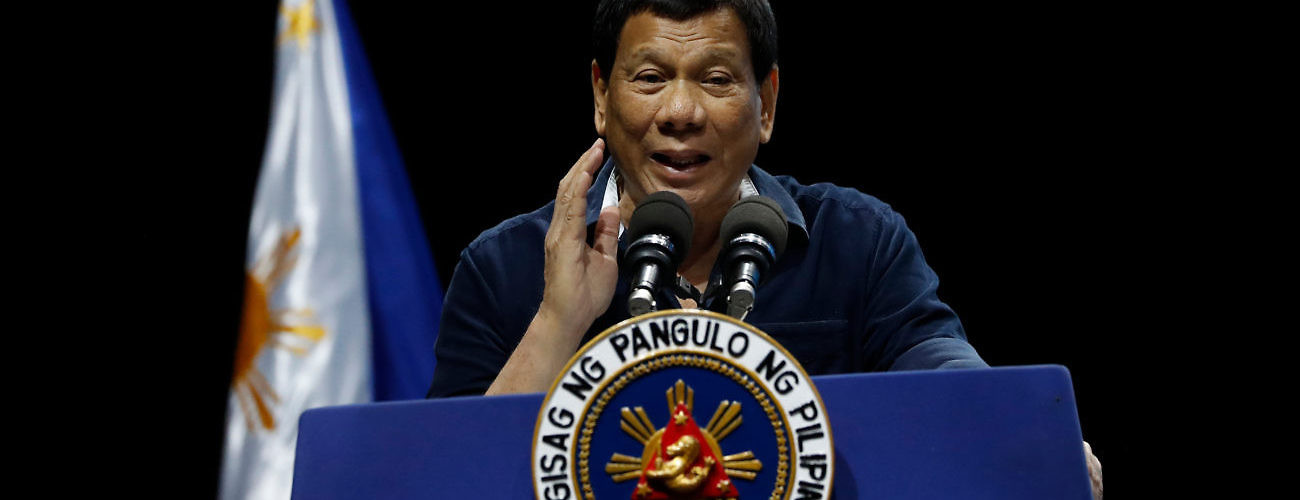Philippine President Rodrigo Duterte addresses the Filipino community in Singapore on April 28, 2018. In March, President Duterte announced that the Philippines would withdraw from the International Criminal Court. (AP Photo/Yong Teck Lim)
The Philippines declared its intention to leave the International Criminal Court (ICC) in March, just a month after the ICC prosecutor announced a preliminary examination into President Rodrigo Duterte’s “war on drugs.” The withdrawal follows a disconcerting pattern whereby governments under scrutiny for possible crimes leave the ICC to avoid prosecution, and raises serious concerns about the long-term ability of the court to prosecute crimes committed by state authorities.
In February, ICC prosecutor Fatou Bensouda announced that her office is looking into the large-scale killings in the Philippines, which could amount to crimes against humanity and, therefore, fall within the jurisdiction of the court. During the preliminary examination, the Office of the Prosecutor (OTP) is focused on analyzing the crimes committed by the government since July 2016—crimes that stem from President Duterte’s campaign against people allegedly involved in the use or sale of illegal drugs. The crackdown by police since 2016 has been brutal. According to Human Rights Watch, more than 12,000 Filipinos have been killed already, at least 2,500 of them by police.
Under the treaty that created the ICC, known as the Rome Statute, the court can only intervene if states are unwilling or unable to prosecute crimes themselves, and part of the ICC OTP’s collecting of information and the steps undertaken by the domestic judiciary is to determine if this is so. If the OTP concludes that Philippine authorities are not doing enough, it can request permission from the ICC judges to open a full investigation.
Prosecutor Bensouda has stressed that a preliminary examination is not an investigation. President Duterte, however, has said he feels unfairly targeted. Duterte pointed out that the ICC’s activities were premature and “effectively created the impression that I am to be charged.” In a lengthy, 15-page statement, he announced that his government will leave the court. “Given the baseless, unprecedented and outrageous attacks on my person as well as against my administration (…) I [declare] that the Philippines is withdrawing its ratification of the Rome Statute effective immediately.“ On March 15, the government reportedly filed its official notice of withdrawal with the UN Secretary-General, as required under the Rome Statute.
Last year, Burundi became the first state party to leave the ICC, and announced its decision to withdraw from the Rome Statute in 2016, a few months after the ICC prosecutor announced a preliminary examination. Other African governments—Gambia, Uganda, and South Africa, to name a few—have threatened to withdraw, criticizing the court for prosecuting heads of states like Sudanese President Omar al-Bashir, who is wanted by the ICC for genocide, crimes against humanity, and war crimes. The refusal of governments to cooperate with the court and to withdraw raises concerns about the efficiency, potency, and fairness of the ICC. According to ICC expert Patryk Labuda, the Philippines’ withdrawal “strongly suggests ICC will never be able to investigate state-sponsored criminality.” If this is the consequence of the investigation in Duterte’s government, it would in essence make the ICC a court for rebels.
In practical terms, when a country withdraws from the Rome Statute, the ICC loses jurisdiction over that country. The prosecutor is only permitted to begin a preliminary examination or an investigation into crimes committed by nationals or on the territory of states parties. Countries that are not members of the ICC are outside its reach, unless the UN Security Council specifically refers the situation to the court. This was the mechanism employed only twice so far, in the cases of Sudan and Libya, which led to the indictments of President al-Bashir and former Libyan President Muammar Gaddafi.
Should the ICC’s jurisdiction and legitimacy become further eroded and more countries withdraw, the international community would have to rely on the Security Council to refer cases to the court. The complexities of the inner workings of the Council aside, their involvement in cases before the court is highly controversial because it could politicize the court proceedings themselves, as some experts have argued.
Moreover, the Security Council is already challenged to refer cases to the court or to enforce its powers in matters related to the ICC. Since the referral of the case of Libya in 2011, members have not reached any agreements on activating the court. Even the most egregious cases, for example the conflict in Syria, have yet to be referred. A lack of action by the Security Council also contributed to a suspension of the ICC’s investigations in Darfur. The Council also has the power to sanction states parties that are not complying with the orders of the ICC, such as arresting suspects under arrest warrant. In reality, this has never happened despite more than a dozen findings of non-compliance by the ICC judges.
Still, as more states threaten to withdraw from the Rome Statute when they come under scrutiny, Security Council referrals are the only avenue to keep the court as a functioning institution. In a circumstance where more states withdraw, the ICC as a treaty-based regime, where states can opt-in and opt-out according to their interests, would need this form of active support from the Security Council.
Benjamin Duerr is an international criminal law analyst based in The Hague. He tweets at @benjaminduerr.





